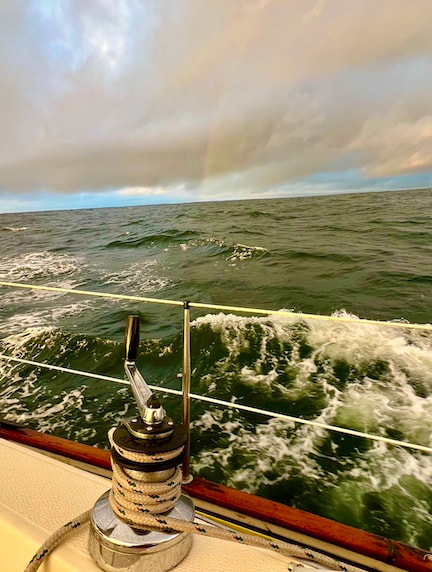 A lone dolphin streaked through the dark water, leaving a trail of phosphorescence across our wake. My first night watch on our first overnight passage was nearly over. In the glow of the red cabin light, Lauren got ready for her midnight to 2am watch. I heard a low grumble or growl. It sounded like a bear, but that was unlikely; we were ten miles off the coast of Northern California, halfway between San Francisco and Monterey. I dismissed the noise as a strange new boat sound - of which there were many that I was getting used to - made while Lauren moved around below. Again I heard a low growl. This time closer and immediately followed by a loud exhale. I looked to port, from where the sound had come, and no more than 100 feet away was the unmistakable low, long form of a whale slipping above and below the waves. It was a magical moonlit moment. Now off watch, I snuggled into my bunk and drifted to sleep high on the joy of being back out at sea. But I didn’t sleep long. I was soon awoken by sails flapping in a dying wind and got up to help douse and stow them. I went to start the engine, but when I turned the key nothing happened. Here we were floating in the middle of the ocean motionless. No wind. No engine. We were in no danger, but my heart was racing and I fought to calm myself and think of next steps. Inevitably things break or go wrong on a boat, and that’s double or triply true on shakedown passages when systems are being used for the first time or haven’t been used for a bit. In the back of my mind I knew something — likely many things — would go a little haywire on this first outing. The engine not starting was par for the course, but it quickly brought me down from the elation I’d been feeling moments before. Diesel engines are mechanical beasts, but most need electricity to get started. Something was off in the wiring, but I wasn’t able to immediately identify the problem while rolling around on a dark sea. Instead, I figured I’d circumvent the problem by jumping the starter - connecting two wires and providing 12-volt power directly to the part that starts the engine. But that didn’t work…. Now I was stumped. Luckily, we were still in cell range and I had a lifeline: diesel mechanic Dick Vosbury in Annapolis, Maryland. He’s more familiar with this very Volvo engine than almost anyone, having sold it to my father when the Dovka belonged to my parents. Fortunately, I caught Dick in his office and he was able to explain what I was doing wrong and how I could successfully jump the starter. A minute later the 3-cylinder was purring along. It was a relief to again be making progress through the water with a working engine, but the root electrical problem is still to be resolved. I've added it to the growing “to do” list, and have spent a lot of time mulling over solutions. It was a first night of highs and lows. I can think of no more appropriate welcome back to this life at sea.
2 Comments
Glen Pullen
12/14/2023 05:47:31 pm
Your writing brings me joy when I read how you love the sea. It’s a mutual one that so many of us feel and have such a hard time explaining to others. But you do a great job and I can’t wait for more. Stay safe and happy sailing.
Reply
Ben
12/15/2023 05:34:07 pm
Thanks Glen
Reply
Leave a Reply. |
Archives
April 2025
Categories |
Site powered by Weebly. Managed by Directnic
 RSS Feed
RSS Feed